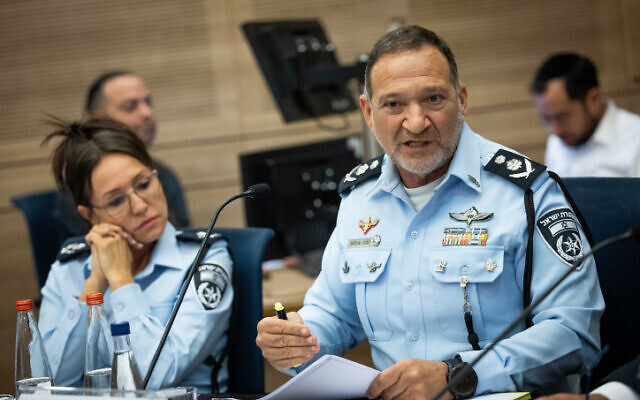Police chief says he won’t seek 4th year in office ‘under these conditions’
Kobi Shabtai, who has had a series of public disagreements with National Security Minister Itamar Ben Gvir, says he is not looking to extend his time in position

Police Commissioner Yaakov (Kobi) Shabtai said Sunday that it was “no secret” he would not seek a fourth year in his position “under these conditions,” a reference widely seen as relating to his ongoing disputes with National Security Minister Itamar Ben Gvir.
Shabtai made the announcement in a speech that he delivered at the National Police Academy in Beit Shemesh near Jerusalem to Arab mayors who visited the complex.
“On a personal note, during my term as commissioner, for the past two-and-a-half years, I’d served under three cabinets and three ministers,” Shabtai said. “I have used the tools at my disposal to the best of my ability to preserve professional standards in accordance with protocol. It is no secret that I do not intend to serve a fourth year under these conditions,” he added.
The standard term for police commissioners in Israel is three years, but it is often extended by a fourth year.
In March, Shabtai announced the reassignment of Deputy Commissioner Amichai Eshed, the head of the police’s Tel Aviv District. The reassignment order was understood to have come from Ben Gvir’s office, following repeated road blockages in Tel Aviv by protesters against the government. Eshed was quoted as saying the protesters “are not against the police” and critics said he treated them leniently.
But Shabtai reversed the reassignment later that month, following a letter by Attorney General Gali Baharav-Miara, which stated that the change should be put on hold because of “legal concerns as to the procedure,” as her office termed it. The police chief said that reassigning Eshed had been a “lapse of judgement” on Shabtai’s part.

In his speech Sunday, Shabtai also complained that “the police is too small to carry out the missions assigned to it.” The situation is worsening, he said. “There aren’t enough patrol cars and officers,” he said.
Arab Israelis are suffering from “a wave of murders,” he said in reference to the slaying of more than 100 Arab Israelis in 2023, most of them in gang warfare and score-settling between criminal enterprises. “We cannot accept such a reality,” Shabtai said.
In a filmed statement shortly after Shabtai’s speech, Ben Gvir thanked the police chief for “decades serving the citizens of Israel.”
Ben Gvir — a far-right lawmaker with a long history of arrests and convictions, including supporting a terrorist organization — acknowledged that he and Shabtai had “profound disagreements,” but that the police chief “has been for many years a strong and good fighter for the State of Israel.”
National Unity party leader Benny Gantz called on Prime Minister Benjamin Netanyahu to prevent Ben Gvir from appointing the next police chief.
“If Netanyahu has any integrity and concern for the security of Israeli citizens, he must ensure that an irresponsible person like Ben Gvir does not appoint the next police commissioner,” Gantz tweeted. “This will be a blow to public security and [cause] serious damage to the police for years ahead.”
Gantz also praised Shabtai, noting that the two had worked closely together when he was defense minister.









